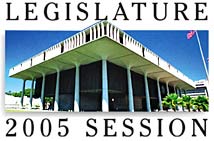Campaign bill puts
clamps on contractors
A proposal to fund certain
candidates fails to reach accord
Contractors doing business with the state or counties would be banned from making contributions to political candidates under a campaign spending reform proposal expected to win final approval by lawmakers this week.
The compromise was reached late Friday as lawmakers wrapped up work on all bills in preparation for final floor votes before the end of the 2005 regular session on Thursday.
|
|
House and Senate members disagreed on which public offices would be the first to abide by the new funding system. The last proposal under consideration would have applied the system to House members only, a provision that House Judiciary Vice Chairman Blake Oshiro said was unacceptable to many colleagues.
Lawmakers also noted that the House and Senate money committees did not provide any general funds to get the funding system started.
Supporters of the so-called "clean elections bill" said they were disappointed at the final outcome but pleased that they brought attention to the issue this year.
"We're not going away," said Ira Rohter, president of the advocate group Clean Elections Hawaii.
The added restrictions to existing campaign laws have been pushed by Robert Watada, the executive director of the Campaign Spending Commission who is retiring after this session.
Although Watada had sought even greater restrictions, he said he was pleased with the compromise that was struck.
Lawmakers failed to reach agreement on lowering the amounts that can be donated to candidates and requiring additional reporting to better identify who is making contributions.
"We have half a loaf," Watada said. "We'll live with half a loaf for now.
"There's a lot more to be done, but I feel that over the last 10 years I've accomplished a good deal, so I'm going to go happily."
The proposal approved in House Bill 1747, Conference Draft 1, bars state or county contractors from making donations from the time a contract is executed until it is completed.
"Basically we'd be trying to cut off that source of funding since there's been so much criticism and problems in the past," Oshiro said.
The proposal also limits the amount of funds candidates can collect from out-of-state sources. The amount of out-of-state funds would be limited to 20 percent of a candidate's total funds during an election cycle.
The provision could be seen as targeting Gov. Linda Lingle, whom Democrats have criticized because of the large amounts she has raised from out-of-state sources during her last two gubernatorial campaigns.
"I think we've heard a lot of concerns over people who are non-residents of this state trying to influence the issues and values that we have here," Oshiro said.
House Bill 1747 also makes intentional false reporting of campaign donations a Class C felony, with the added provision that if a candidate is found to have intentionally filed a false report then that person may not enter a "deferred acceptance of guilt" plea.
A deferred acceptance plea allows a defendant to put off his plea in hopes of receiving a lesser sentence or having the charge wiped from his record, provided he abides by conditions set by a judge.
[News] [Business] [Features] [Sports] [Editorial] [Do It Electric!]
[Classified Ads] [Search] [Subscribe] [Info] [Letter to Editor]
[Feedback]

